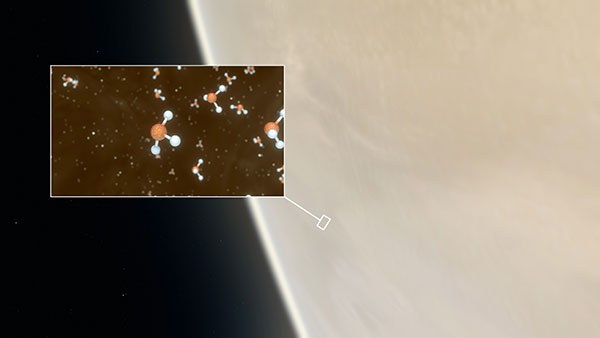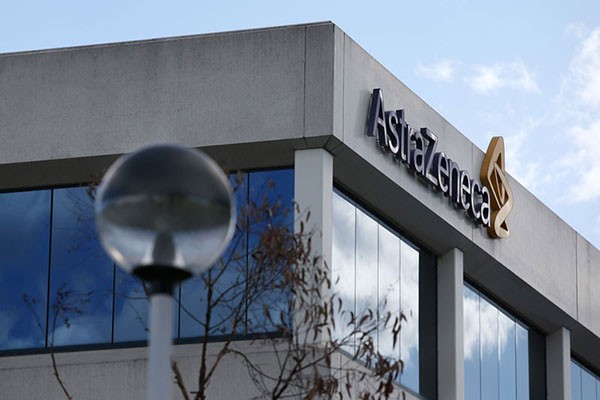Daily briefing: ‘Unexplained’ molecule on Venus hints at life
Phosphine in Venus’s atmosphere raises the tantalising idea of life on the planet. Plus, the Oxford–AstraZeneca vaccine trial is back on and the lasting misery of coronavirus long-haulers.
by Flora GrahamHello Nature readers, would you like to get this Briefing in your inbox free every day? Sign up here

ESO/M. Kornmesser/L. Calçada & NASA/JPL/Caltech
‘Unexplained’ molecule on Venus hints at life
Phosphine has been detected in Venus’s atmosphere, raising the thrilling question of whether the molecule might be a sign of life on the planet. On rocky planets, life is the only known source of the compound — although it forms without a helping hand near the energetic cores of the gas giants. Life seems impossible on the surface of the Solar System’s hottest world, but the middle of its cloud layer offers a more promising environment in terms of temperature, pressure and presence of water and organic molecules. Even if it’s not a sign of life on Venus, the unexpected observation is exciting: “Whether it’s life or not, it has to be a really exotic mechanism,” says quantum astrochemist Clara Sousa-Silva, who co-authored the study. “Something weird is happening.”
National Geographic | 11 min read
Reference: Nature Astronomy paper
The rise of China’s military in medical research
Scientists in China’s People’s Liberation Army (PLA) helped to develop the world’s first COVID-19 vaccine to be approved for limited use (in military personnel). Other militaries, including that of the United States, work on vaccines and conduct medical research. But the sheer size of the PLA and the speed at which reforms are taking place make its scientific transformation noteworthy — and, for some, a cause for concern. In July, the US indicted two Chinese nationals for spying on firms conducting coronavirus research, including front-running vaccine developer Moderna. Scientists have also raised concerns about the ethics of approving a vaccine that is still being trialled.
COVID-19 coronavirus update

Lisa Maree Williams/Getty
Oxford–AstraZeneca vaccine trial restarts
The trial of a leading vaccine candidate from the University of Oxford and pharmaceutical company AstraZeneca restarted in the United Kingdom on Saturday. Enrolment in global trials was paused on 6 September, after a person participating in the UK trial experienced an adverse reaction. Such pauses are not uncommon in large trials — this was the second time that this trial had been put on hold. But some scientists have criticised the trial sponsors for not being more transparent. The University of Oxford and AstraZeneca have not yet released details of the adverse reaction that led to the trial pause and how the decision to resume the UK study was made. It is also not known whether trials of the vaccine in South Africa, Brazil and the United States will resume.
The lasting misery of coronavirus long-haulers
Months after infection with SARS-CoV-2, some people are still battling crushing fatigue, lung damage and other symptoms of ‘long COVID’. Doctors are concerned that the pandemic will lead to a significant surge of people experiencing lasting illnesses and disabilities. But, because the disease is so new, the long-term impacts are unknown. “The problem is,” says clinical radiologist Ali Gholamrezanezhad, “to assess long-term consequences, the only thing you need is time.”
The cost of ‘natural’ herd immunity
“The cost of reaching herd immunity through natural infection would be very high,” write infectious-disease researchers Arnaud Fontanet and Simon Cauchemez. An effective vaccine is the safest way to subdue large coronavirus outbreaks through widespread immunity, they say in a sober overview of what’s at stake. They note that an “optimistic” herd immunity threshold of 50% would not be reached in the United States before “500,000–2,100,000 deaths”.
Nature Review Immunology | 7 min read
Notable quotable
“What we didn’t model for is that people would choose to go to a party if they knew that they were positive.”
The University of Illinois at Urbana–Champaign (UIUC) has a mass-testing programme that has been touted as a model system. Students have to get tested twice a week, or risk losing their academic standing. But the institute has seen a spike in infections in recent weeks. Martin Burke, a chemist at UIUC who helped to develop the university’s RNA-based saliva test, spoke to Nature about the challenges and lessons of mass testing on campus. (Nature | 6 min read)
Features & opinion
Clear the way for visually impaired scientists
Chemist Naheda Sahtout is legally blind and has faced challenges while pursuing her laboratory research career. She argues that science needs to start a conversation to attract and empower more researchers like her. “I might occasionally need someone to help me look down a microscope, or an alternative project that makes use of my expertise and capabilities, but this doesn’t mean my scientific thinking or ability to analyse data, write papers and come up with fresh ideas is compromised,” says Sahtout. “I shouldn’t be made to feel as if seeking help is a bad thing.”
Reward the data-sharers
The misalignments of incentives, rewards and penalties is the biggest hurdle to the widespread sharing of scientific datasets, argues a Nature Biomedical Engineering editorial. “There are therefore plenty of incentives (both carrots and sticks) for authors to present their data on a silver platter,” says the editorial. “Rewards are harder to come by.” The editorial argues for tangible incentives at the right time, bigger rewards, and penalties only as a last resort.
Nature Biomedical Engineering | 5 min read
Quote of the day
“I wear the nerdiest glasses I have and often a jacket that has my college logo, so that people don’t mistake me for what they think is a thug or hooligan.”
Ecologist Christopher Schell shares how he prepares defences against racist harrassment while doing fieldwork. (Associated Press | 5 min read)
Resume refresh
A free webcast for PhD students and other early-career researchers, hosted by Nature’s own Jack Leeming, will help you to craft the perfect CV. The event will touch on structure, what you should include and how industry and academic CVs differ. Sign up to watch the webcast on Friday, 9 October at 15:00 UTC (that’s 8 a.m. PDT, 11 a.m. EDT, 4 p.m. BST and 5 p.m. CEST).
Last week, Leif Penguinson cooled down by a stream lined with volcanic rock at Kipahulu Forest Reserve in Hawaii. Did you find the penguin? When you’re ready, here’s the answer.
Flora Graham, senior editor, Nature Briefing
With contributions by Smriti Mallapaty